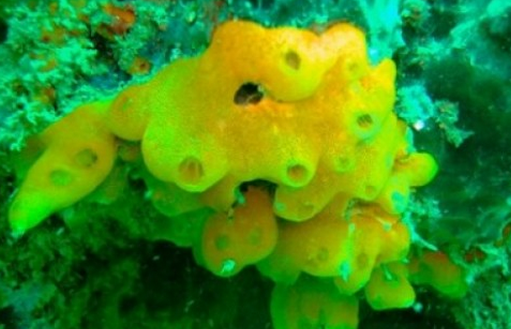
Didemnum aurantium, a species whose name refers to the orange color of their colonies, which measure 1.5 cm-5 cm in length.
Brazilian researchers described five new species of ascidians, commonly known as sea squirts, ascidians are marine invertebrates that generally form permanently submerged colonies.
When the larval stage of the animals is completed, they attach themselves to rocks, shells and shipwrecks, losing the ability to swim or move. Their best defense against predators is the production of chemical substances.
What attracts researchers, besides the opportunity to enhance taxonomic knowledge of the group, are the potential uses of these natural compounds, which can contribute to the development of new medical drugs and pesticides, among other products.
Some 120 species of ascidians had previously been described on the basis of exemplars found in Brazil. The five new species come from the coast of Bahia State; one of the five was also found off the coast of Espírito Santo. The team members who made the discovery are affiliated with the Federal University of Paraná's Zoology Department (DZ-UFPR).
The researchers' taxonomic analysis of the samples was supported by The S?o Paulo Research foundation (FAPESP) through the Thematic Project "Investigation of metabolic and biotechnological potential of marine organisms in bioremediation processes and for the production of substances with anti-viral, anti-inflammatory and anti-Leishmania activities," coordinated by Roberto Gomes de Souza Berlinck, a professor at the University of S?o Paulo's S?o Carlos Chemistry Institute (IQSC-USP).
There are some 3,000 known species of ascidians worldwide, 20% of them in the family Didemnidae, including the exemplars from coastal Brazil. Four of the five new species belong to the genus Didemnum and were found in Bahia (D. aurantium, D. flammacolor, D. lambertae, and D. longigaster). The other new species belongs to the genusDiplosoma (D. citrinum) and was found in both Bahia and Espírito Santo.
"Exotic molecules obtained from research on ascidians have been explored worldwide for use in combating cancer," she added. "However, preclinical trials are often aborted because of these animals' high toxicity. The substances they produce can eliminate cancer cells, but they also destroy healthy cells. Nowadays there are different, more diversified targets, such as Parkinson's, Alzheimer's, leishmaniasis and malaria," said Rosana Moreira da Rocha, a researcher at DZ-UFPR and coordinator of the studies that resulted in a paper published in January in Journal Zootaxa.
With regard to ascidians specifically, Moreira da Rocha believes much remains to be discovered in Brazilian territory because vast areas of the coast have not yet been visited by researchers interested in these marine animals.
"Some of our coastal waters are naturally oligotrophic, deficient in nutrients, compared with the Pacific coast, for example. Nevertheless, we expect to continue finding new species," she said.
Story Source:
The above story is based on materials provided by Funda??o de Amparo à Pesquisa do Estado de S?o Paulo. Note: Materials may be edited for content and length.
Journal Reference:
- ROSANA MOREIRA DA ROCHA, ISABELA MONTEIRO NEVES, GUSTAVO ANTUNES GAMBA. New species of Didemnidae (Tunicata: Ascidiacea) from the tropical coast of Brazil. Zootaxa, 2015; 3905 (3): 381 DOI:10.11646/zootaxa.3905.3.4

